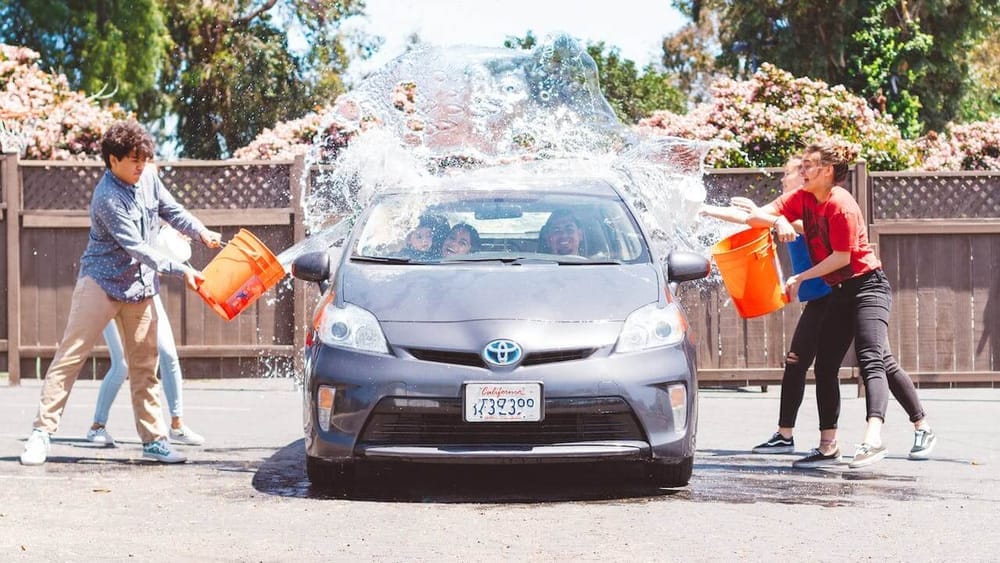How to Host a Fundraising Event
Hosting an event can be one of the most exciting and helpful experiences for a business or organization. It's the perfect opportunity to bring people together, raise awareness for a particular cause, and achieve your goals! However, I also know how challenging and overwhelming it can be if you're unaware of what it entails. The amount of time, planning, and responsibility a fundraiser requires can wear anyone thin. But don't worry. Here at Bold.org, we've got you covered!
In this Bold article, I’ll go over what a fundraising event is, the importance of fundraising events, and the different types of fundraising and charity events out there.
I’ll also provide a comprehensive step-by-step guide on how to host your very own successful fundraising event. The impact you can have on your community is priceless, so if you're planning on hosting a fundraising event to raise money and support a good cause, you've come to the right place.
Looking to support a student and help them raise funds for school? Visit our Scholarship Blog and learn how to apply and create your own fund today!

What Is a Fundraising Event?
A fundraising event is an event or campaign designed to raise awareness and donations and support a business or nonprofit organization's mission. Their primary point is to support the cause at hand by raising money to reach their financial goal. For example, if your local high school's football team is looking to raise funds for new team uniforms, they will most likely hold an event to bring the school and community together to reach their budget goal for their new uniforms.
Although fundraisers are meant to raise funds for a cause, I want to shine a light on how they also provide people with a sense of support and kindness. As an active member of your community, you want to feel heard and supported by those around and hosting fundraising events brings that ear and support. Not to mention, the sense of accomplishment you feel after is unmatched. Not only does it leave a positive impact on the community, it leaves a positive impact on you. Overall, hosting fundraisers can go a long way for a community.
Check out some fundraising ideas now!
The Importance of Fundraising
When you're in a pinch, a helping hand can make all the difference. That's why fundraising is so important. Not only are you helping those in need, it's raising money for good causes. Fundraising plays a huge role in supporting various causes and organizations with projects to help reach goals.
Fundraising can also help ensure the long-term sustainability of local businesses, non-profit organizations, as well as other organizations and causes. By securing financial support for these organizations, fundraisers allow continuous operation and expand their reach, making a lasting difference all over the world.
Another reason why fundraising is important is because it raises awareness and encourages advocacies within communities. Fundraising events and campaigns bring attention to important issues and causes. They provide platforms to engage donors, educate the public, promote understanding, and advocate for positive change. Getting involved in your community can help it grow and become better.
The Benefits of Fundraising
When you think of a fundraiser, you immediately think of donations. And while that is part of the goal of a fundraising event, the benefits aren't limited to just raising money. There are numerous advantages of fundraising that could lead to other events in the future. For instance, the way they bring people together. As a community, you want to make sure you're working towards the greater good of its people, and hosting a fundraising event does just that. Not only does it create unity, but it also creates the demand for another in-person event.
Along with bringing people together, peer-to-peer fundraising supports the community. Think of it this way: in order for children to have clean and safe playgrounds, hosting fundraising events is the main way to get them. It ensures your community reaches its fundraising event goals.
Aside from community, fundraising can also benefit those in need. Whether it be local businesses, a school, an organization, a sports team, or a company, any fundraising event will boost the longevity of those in need. As long as you're supporting your target audience, you are guaranteed a successful fundraiser.

But let’s not forget about you. Hosting a fundraising raising can benefit your personal growth. Not only will it build up your resume, but it will also show people you can delegate and work with as a team. From handling ticket sales and managing social media output and engagement to creating marketing materials, you and the people on your team are growing within your professional and personal selves. The feeling of unity extends from the outside community to the inside.
Choosing the Right Kind of Fundraiser
Choosing the right kind of fundraiser is key to reaching your goal and community. That's why it's important to do some research on what kind of fundraising event you want and go from there. To have a successful event, you want to make sure the event details encourage philanthropy and giving back to society. Your fundraiser should provide people, businesses, and foundations with a lane to contribute to causes they care about, making a positive difference in the world.

Most Popular Types of Fundraisers
So, you've figured out what kind of fundraising event you want to host, and now it's show time! Peer-to-peer fundraising can be such fun planning, but with so many options out there, how do you know where to begin? Easy. With us at Bold.org!
Take a look at our list of the most popular types of fundraisers you can throw. And trust me when I say there is something for everyone and then some!
School Fundraisers
- Bake Sale
- Toy Drive
- Raffle
- Silent auction
- Talent Show
- Car wash
- Carnival
- Pajama Day
- Shoe Drive
Public Fundraisers
- Dance Marathon
- Community Garage Sale
- Crowdfunding
- 5k Run or Walk
- Art Show
- Sports Charity Event
- Cooking Contest
- Movie Night
- Trivia Night
- Community Scavenger Hunt
And the list goes on! It's important to note these are only a few suggestions that might help your charity event planning. There are plenty of other options out there to choose from! As long as your event correlates with your target audience, you are good to go!
Looking for ways to fundraise for a school club? Explore our Scholarship Blog for more tips!

How to Plan a Successful Fundraising Event: A Step-By-Step Guide
Now that you’ve decided on what type of fundraising event you want to host, it's time to put it all together.
Below is our comprehensive 7-step guide on how to successfully plan a fundraising event, and if you follow our method, you are sure to leave a lasting impression as a host.
1. Define your type of fundraiser - First things first, you want to define the purpose of your fundraising event. Ask yourself questions like, what is the goal? Who do you want to help? How much money do you want to raise? Once you have all those key details in order, you're on your way to fundraising success.
2. Set a fundraising budget - While fundraising events can be super lucrative, they can also cost money. But there is a saying: it takes money to make money, so you want to make sure your financial investment for your event makes financial success. You want to take everything into account: venue, entertainment, food, weather support, the use of event management software, supplies (chairs, tables, tents, etc.), staff, sound, ticketing, etc. After taking these factors into consideration, set a fundraising budget that will cover these expenses and not take away from your fund.
3. Form a strong fundraising team - Now that the ball is rolling, next is devising your fundraising team. These are the people who are going to steer the ship with you and help you pick up where you are lacking. Hosting a fundraising event takes a lot of work and responsibility, so your team should be willing to take on the load with you and reach your goal together. Remember: teamwork makes the dream work!

4. Create an engaging experience - After securing the kind of fundraising event you want to have, you want to make sure you create an engaging experience for everyone. This is where you can be creative! If you are hosting a bake sale for your local elementary school, you'd want to have fun activities for the kids to enjoy, like pin the cherry on the cupcake or a cookie-eating contest for the parents. Don't limit yourself from your ideas. Your fundraising efforts will not go unnoticed when everyone is enjoying themselves.
5. Set a date - Once you have everything in order, your next step is to officially set a date. This can be challenging but not impossible. You'd want to pick a day and time that best suits the goal at hand. If you're hosting a school fundraiser, a school night would likely be your best fit, but if it's a public fundraising event, the weekend is your best choice.
6. Market your fundraiser - With everything falling into place, there is only one thing left to make it a success: marketing! This should also be a collective effort from you and your team, and there are plenty of ways to promote and market your event. Direct mail, social media, word of mouth, mass email, creating an event page, flyers, bulletin posts, etc. Make sure your marketing efforts take heed once your date is set.
7. Setting up your fundraiser - If you are hosting the fundraising event, setting up the event should be a team effort. This is a day where everything can go wrong, but if everyone is on board and working together, the setup will be quick and painless.
With the help of our 7-step guide, your fundraising event can do better than expected. The key is to stay focused, work together, and watch it come to life!

Looking for Volunteers
The key to hosting a successful fundraising event is having the right people by your side to help support not only the cause but you as well. That's why it's so important to enlist volunteers with the same goals as you. Having a strong team will lead your fundraising event to great heights.
The Ideal Volunteer
Realistically, your ideal volunteer should align with your ideal employee. In order for the planning process to go smoothly, you want your event team to match that same professional energy. When scouting for volunteers, I recommend looking at a few key aspects like:
- You want your ideal volunteer to be responsible. This goes beyond showing up on time. This person should be involved in all event details, times, schedules, vendors, etc. As a group, it's key to always stay on the same page.
- You want your ideal volunteer to take the initiative. It can be overwhelming to lead a team. That's why having volunteers to help assist in areas you haven't gotten to is so important. Suppose that means taking control of the event page, social media marketing, seeking guest speakers, spreading the word, and looking over raffle tickets. In that case, your volunteers should collectively be putting their hands in the pot and helping the event planning run smoothly.
- You want your ideal volunteer to have professional work experience. Though it's not a requirement, having someone on your event staff who knows how a day-to-day business works will only work to your advantage. They will know how much time and effort it takes to put on large-scale events and all the details that come along with it. They could also have experience in areas you may not, like knowing how to recruit volunteers, what kind of fun games your type of event should have, how to spread awareness,
- And lastly, you want your ideal volunteer to be a team player. Planning a fundraising event or any kind of charity event is hard work, and the only way to make it a success is by having team players on your side. That means taking initiative, lending helping hands, working together on tasks, bringing fundraising ideas to the table, and more. This will not only make the day of the event go smoothly but also ensure a successful day.
No matter what, your ideal volunteer should align with your goals for the fundraiser. Volunteering is a great way to gain professional experience, as well as work with others, so even if you've never had a regular job, don't let that discourage you. The goal is to ensure a great day for the community. And you never know. Your first fundraising event team could become your forever A team!
How to Raise Awareness for Your Cause
Raising awareness for your cause goes hand-in-hand with promotional and marketing efforts, and I can't emphasize the importance of good marketing. With access to social media and other online forums, coming up with marketing ideas can be another way to get creative. You can create anything from 20-second promotional reels or videos for various social platforms like Instagram, TikTok, and/or Facebook to interactive E-vites. Thinking outside of the box will not only generate interest but also set you apart as a host, leading more organizations to seek you and your team out for all fundraising event needs.
Ways to Collect Donations
Now, when it comes to the money, there are different ways to collect donations from potential donors. Even if you're holding an in-person event, you can still collect donations via online platforms like GoFundMe and other ways like donor boxes, crowdfunding, sponsorship from local businesses, corporate sponsorship, peer-to-peer fundraising, etc. Again, don't limit yourself to possibilities to raise additional funds for your cause.

Hosting a Virtual Fundraising Event
Since Covid-19 impacted our everyday lives, the way we see social gatherings isn't the same. That's why virtual fundraising can be your best alternative to hosting fundraising events. It provides another platform to reach your target audience and provide them with the same sense of support. It can also break through geographical barriers and reach an even wider audience.
Virtual fundraising events also help you save costs on major money spenders like venue, food, and event staff, which takes away from the total fund goal. Without these expenses, your fund will generate more revenue for the cause.
Enjoy Your Fundraiser
Congratulations. You made it! It's event day, the vendors have arrived, the crowd is spilling in, and everyone has a smile on their face. After weeks (maybe months!) of planning for this day, the fundraiser has finally come to life, and all of the hard work from you and your team has paid off (no pun). And now it's time to enjoy your fundraiser.
Preparing for Your Next Event
Now, before you throw in the towel after your first successful event, think about the good you can do for your community in the future. This time could be used to think ahead and make a plan for your next fundraiser that you can build on. Like your first event, you want to plant the seed and water it as time passes, so if you design an outline of how you'd like your next fundraising event to go, you can build it up and change it as you go! Staying one step ahead will always lead you to paths of success.
Wondering if fundraisers are tax deductible? Browse our blog to learn more!

Frequently Asked Questions About How to Host Fundraising Events
Are fundraising events only for nonprofit organizations?
While you might think fundraising events are only done to benefit nonprofit organizations, the good news is they aren't! Anyone can host a fundraising event. However, it's important to know that if you are looking to raise money for yourself, you can hold your own personal fundraiser on popular online platforms like GoFundMe. If you want to bring people together, follow our steps to host your successful event.
Is it difficult to host a fundraising event?
Hosting a fundraiser can be challenging if you don't know where to begin. That's why it's important to do your research on fundraising and event planning. With the right tools, you'll be prepared, organized, and ready to host a very successful fundraising event.
Do I need work experience to become a volunteer for a fundraising event?
As students, it's hard to juggle a school-life balance, let alone adding a 9-5 to the mix, so having professional work experience isn't necessary when volunteering. Though it gives you hands-on experience working on a team, volunteers can learn just as much as employees through volunteer work. So, if you've never had a job or would simply like to volunteer, starting at a fundraising event is a good way to go!
Visit our Scholarship Blog to learn more information about how to host fundraising events and apply for scholarships today.

About Bold.org Donor Team
At Bold.org, our Donor Team is driven by a shared commitment to helping individuals and organizations make a lasting difference through scholarships and charitable giving. We are passionate about supporting donors throughout their philanthropic journey, ensuring that their contributions create lasting, positive change.
Our commitment goes beyond guiding donors through the scholarship process—we also craft educational content that shares our expertise and inspires impactful giving. By creating donor-focused resources, we not only support donors directly but also provide valuable insights to help them navigate their mission of giving with confidence.
With extensive experience in fundraising, scholarship creation, and donor relations, we specialize in bringing your vision to life. Whether it’s crafting a scholarship that reflects your values or ensuring your generosity opens doors for students, our team is here to help you achieve your philanthropic goals.
We believe philanthropy should be accessible, transformative, and deeply rewarding. Every piece of content we write, every scholarship we help build, and every relationship we nurture is driven by our shared goal: to empower donors and change lives through education. Together, we’re shaping a brighter future, one contribution at a time.